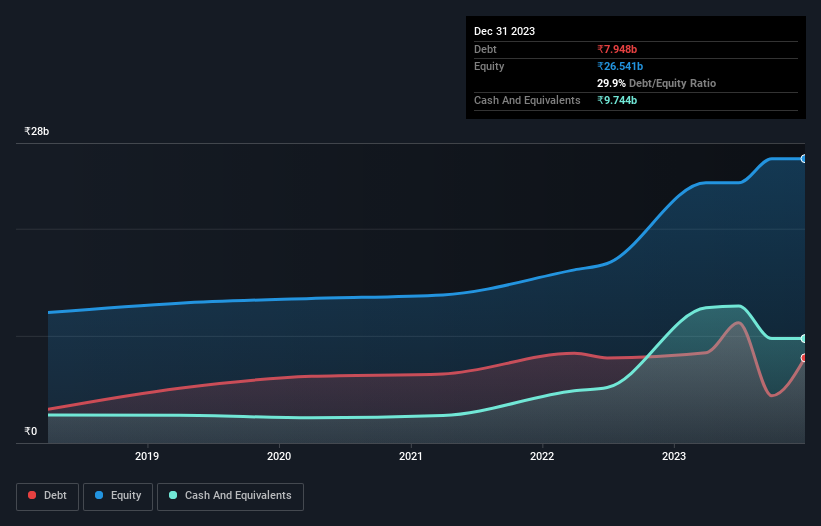
Some say volatility, rather than debt, is the best way to think about risk as an investor, but Warren Buffett famously said that 'Volatility is far from synonymous with risk.' So it might be obvious that you need to consider debt, when you think about how risky any given stock is, because too much debt can sink a company. We can see that Global Health Limited (NSE:MEDANTA) does use debt in its business. But should shareholders be worried about its use of debt?
When Is Debt A Problem?
Debt and other liabilities become risky for a business when it cannot easily fulfill those obligations, either with free cash flow or by raising capital at an attractive price. Ultimately, if the company can't fulfill its legal obligations to repay debt, shareholders could walk away with nothing. However, a more frequent (but still costly) occurrence is where a company must issue shares at bargain-basement prices, permanently diluting shareholders, just to shore up its balance sheet. Of course, plenty of companies use debt to fund growth, without any negative consequences. The first step when considering a company's debt levels is to consider its cash and debt together.
Check out our latest analysis for Global Health
What Is Global Health's Debt?
You can click the graphic below for the historical numbers, but it shows that Global Health had ₹7.95b of debt in September 2023, down from ₹8.42b, one year before. But it also has ₹9.74b in cash to offset that, meaning it has ₹1.80b net cash.

How Strong Is Global Health's Balance Sheet?
The latest balance sheet data shows that Global Health had liabilities of ₹6.41b due within a year, and liabilities of ₹7.84b falling due after that. Offsetting this, it had ₹9.74b in cash and ₹2.57b in receivables that were due within 12 months. So its liabilities total ₹1.94b more than the combination of its cash and short-term receivables.
Having regard to Global Health's size, it seems that its liquid assets are well balanced with its total liabilities. So it's very unlikely that the ₹330.3b company is short on cash, but still worth keeping an eye on the balance sheet. While it does have liabilities worth noting, Global Health also has more cash than debt, so we're pretty confident it can manage its debt safely.
In addition to that, we're happy to report that Global Health has boosted its EBIT by 60%, thus reducing the spectre of future debt repayments. The balance sheet is clearly the area to focus on when you are analysing debt. But ultimately the future profitability of the business will decide if Global Health can strengthen its balance sheet over time. So if you're focused on the future you can check out this free report showing analyst profit forecasts.
Finally, a company can only pay off debt with cold hard cash, not accounting profits. Global Health may have net cash on the balance sheet, but it is still interesting to look at how well the business converts its earnings before interest and tax (EBIT) to free cash flow, because that will influence both its need for, and its capacity to manage debt. During the last three years, Global Health produced sturdy free cash flow equating to 59% of its EBIT, about what we'd expect. This cold hard cash means it can reduce its debt when it wants to.
Summing Up
We could understand if investors are concerned about Global Health's liabilities, but we can be reassured by the fact it has has net cash of ₹1.80b. And it impressed us with its EBIT growth of 60% over the last year. So we don't think Global Health's use of debt is risky. Over time, share prices tend to follow earnings per share, so if you're interested in Global Health, you may well want to click here to check an interactive graph of its earnings per share history.
When all is said and done, sometimes its easier to focus on companies that don't even need debt. Readers can access a list of growth stocks with zero net debt 100% free, right now.
New: Manage All Your Stock Portfolios in One Place
We've created the ultimate portfolio companion for stock investors, and it's free.
• Connect an unlimited number of Portfolios and see your total in one currency
• Be alerted to new Warning Signs or Risks via email or mobile
• Track the Fair Value of your stocks
Have feedback on this article? Concerned about the content? Get in touch with us directly. Alternatively, email editorial-team (at) simplywallst.com.
This article by Simply Wall St is general in nature. We provide commentary based on historical data and analyst forecasts only using an unbiased methodology and our articles are not intended to be financial advice. It does not constitute a recommendation to buy or sell any stock, and does not take account of your objectives, or your financial situation. We aim to bring you long-term focused analysis driven by fundamental data. Note that our analysis may not factor in the latest price-sensitive company announcements or qualitative material. Simply Wall St has no position in any stocks mentioned.
About NSEI:MEDANTA
Flawless balance sheet with reasonable growth potential.


